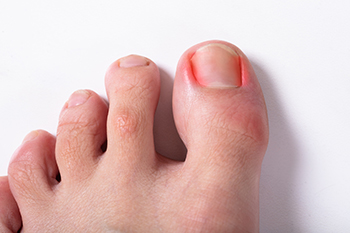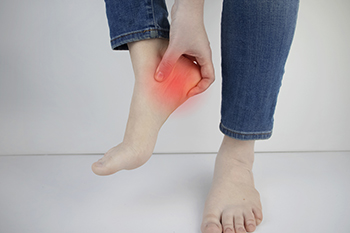
The three most common forms of arthritis that attack the joints of the feet are rheumatoid arthritis, osteoarthritis, and gout. Osteoarthritis gradually wears down cartilage in the joints and typically affects weight bearing joints, such as the ankle. Rheumatoid arthritis is an autoimmune disorder where the immune system attacks healthy tissue, including the synovium (lining in the joints). With gout, uric acid that cannot be properly expelled from the body can crystallize and build up on joints: most typically the big toe joint. These types of arthritis can cause symptoms including pain, warmth, stiffness, swelling, deformity in the joints, and more. If your feet or ankles are in pain due to any type of arthritis, make an appointment with your local podiatrist who can diagnose your condition and determine the best way to treat it.
Arthritis can be a difficult condition to live with. If you are seeking treatment, contact Dr. Edward D. Hutson from Easton, PA. . Our doctor can provide the care you need to keep you pain-free and on your feet.
Arthritic Foot Care
Arthritis is a joint disorder that involves the inflammation of different joints in your body, such as those in your feet. Arthritis is often caused by a degenerative joint disease and causes mild to severe pain in all affected areas. In addition to this, swelling and stiffness in the affected joints can also be a common symptom of arthritis.
In many cases, wearing ill-fitting shoes can worsen the effects and pain of arthritis. Wearing shoes that have a lower heel and extra room can help your feet feel more comfortable. In cases of rheumatoid arthritis, the arch in your foot may become problematic. Buying shoes with proper arch support that contour to your feet can help immensely.
Alleviating Arthritic Pain
It is best to see your doctor for the treatment that is right for your needs and symptoms. Conditions vary, and a podiatrist can help you determine the right method of care for your feet.
If you have any questions, please feel free to contact our offices located in Easton, and Northampton, PA . We offer the newest diagnostic tools and technology to treat your foot and ankle needs.
 When the toenail becomes curved and grows into the skin along the sides of the nail, it forms an ingrown toenail. This can result in pain, inflammation, redness, swelling, and in some cases an infection. Issues such as genetics, improperly trimmed toenails, sweaty feet, and shoes that are too tight can all lead to ingrown toenails. In fact, athletes are particularly prone to ingrown toenails because they sweat more often. While ingrown toenails are usually not very serious, if left untreated, they can get very painful and may even get infected. Patients with ingrown toenails who have diabetes or a compromised immune system, have persistent pain, or believe that the nail is infected should consult with a podiatrist for treating the nail.
When the toenail becomes curved and grows into the skin along the sides of the nail, it forms an ingrown toenail. This can result in pain, inflammation, redness, swelling, and in some cases an infection. Issues such as genetics, improperly trimmed toenails, sweaty feet, and shoes that are too tight can all lead to ingrown toenails. In fact, athletes are particularly prone to ingrown toenails because they sweat more often. While ingrown toenails are usually not very serious, if left untreated, they can get very painful and may even get infected. Patients with ingrown toenails who have diabetes or a compromised immune system, have persistent pain, or believe that the nail is infected should consult with a podiatrist for treating the nail.
Ingrown toenails can become painful if they are not treated properly. For more information about ingrown toenails, contact Dr. Edward D. Hutson of Easton, PA. . Our doctor can provide the care you need to keep you pain-free and on your feet.
Ingrown Toenails
Ingrown toenails occur when a toenail grows sideways into the bed of the nail, causing pain, swelling, and possibly infection.
Causes
Prevention
Because ingrown toenails are not something found outside of shoe-wearing cultures, going barefoot as often as possible will decrease the likeliness of developing ingrown toenails. Wearing proper fitting shoes and using proper cutting techniques will also help decrease your risk of developing ingrown toenails.
Treatment
Ingrown toenails are a very treatable foot condition. In minor cases, soaking the affected area in salt or antibacterial soaps will not only help with the ingrown nail itself, but also help prevent any infections from occurring. In more severe cases, surgery is an option. In either case, speaking to your podiatrist about this condition will help you get a better understanding of specific treatment options that are right for you.
If you have any questions please feel free to contact our offices located in Easton, and Northampton, PA . We offer the newest diagnostic and treatment technologies for all your foot and ankle needs.
A bunion is a bony bump that can grow along the outside of the foot at the base of the big toe. Bunions are considered a deformity, as they change the shape and structure of the foot. When left untreated, bunions tend to progressively worsen. If you have bunions, there are several measures that you can take to prevent them from getting worse. During the day, wear wider, more comfortable shoes that give your toes some wiggle room. At night, wear a splint on the affected toe to help keep it in proper alignment and reduce pain and discomfort. Strengthen your toes with various foot exercises. To reduce pain at home, soak your feet in a warm bath, apply ice to the bunion, or take over-the-counter pain medications. If you have painful bunions, please seek the care of a podiatrist.
If you are suffering from bunions, contact Dr. Edward D. Hutson of Easton, PA. . Our doctor can provide the care you need to keep you pain-free and on your feet.
What Is a Bunion?
A bunion is formed of swollen tissue or an enlargement of boney growth, usually located at the base joint of the toe that connects to the foot. The swelling occurs due to the bones in the big toe shifting inward, which impacts the other toes of the foot. This causes the area around the base of the big toe to become inflamed and painful.
Why Do Bunions Form?
Genetics – Susceptibility to bunions are often hereditary
Stress on the feet – Poorly fitted and uncomfortable footwear that places stress on feet, such as heels, can worsen existing bunions
How Are Bunions Diagnosed?
Doctors often perform two tests – blood tests and x-rays – when trying to diagnose bunions, especially in the early stages of development. Blood tests help determine if the foot pain is being caused by something else, such as arthritis, while x-rays provide a clear picture of your bone structure to your doctor.
How Are Bunions Treated?
If you have any questions, please feel free to contact our offices located in Easton, and Northampton, PA . We offer the newest diagnostic and treatment technologies for all your foot care needs.
 Pain under the heel, especially if you are a jogger or runner, may be a sign that you have plantar fasciitis. This condition affects the plantar fascia, a band of tissue that runs from the heel to the ball of your foot. It is more common with older people, especially women, but can also be the result of repetitive stress, which causes inflammation. This results in pain that may feel worse if you stand a lot or put pressure on your heel. Being overweight also contributes to the discomfort. One thing you can do is cease the activities that are likely causing or aggravating the condition. Taking anti-inflammatory medication may help to dull the pain. Several stretches can help reduce or alleviate the symptoms. For severe cases, it is suggested that you see a podiatrist who can prescribe custom orthotics, administer injections to the affected area, and offer other solutions, such as ultrasound therapy or even surgery.
Pain under the heel, especially if you are a jogger or runner, may be a sign that you have plantar fasciitis. This condition affects the plantar fascia, a band of tissue that runs from the heel to the ball of your foot. It is more common with older people, especially women, but can also be the result of repetitive stress, which causes inflammation. This results in pain that may feel worse if you stand a lot or put pressure on your heel. Being overweight also contributes to the discomfort. One thing you can do is cease the activities that are likely causing or aggravating the condition. Taking anti-inflammatory medication may help to dull the pain. Several stretches can help reduce or alleviate the symptoms. For severe cases, it is suggested that you see a podiatrist who can prescribe custom orthotics, administer injections to the affected area, and offer other solutions, such as ultrasound therapy or even surgery.
Plantar fasciitis is a common foot condition that is often caused by a strain injury. If you are experiencing heel pain or symptoms of plantar fasciitis, contact Dr. Edward D. Hutson from Easton, PA. . Our doctor can provide the care you need to keep you pain-free and on your feet.
What Is Plantar Fasciitis?
Plantar fasciitis is one of the most common causes of heel pain. The plantar fascia is a ligament that connects your heel to the front of your foot. When this ligament becomes inflamed, plantar fasciitis is the result. If you have plantar fasciitis you will have a stabbing pain that usually occurs with your first steps in the morning. As the day progresses and you walk around more, this pain will start to disappear, but it will return after long periods of standing or sitting.
What Causes Plantar Fasciitis?
There are some risk factors that may make you more likely to develop plantar fasciitis compared to others. The condition most commonly affects adults between the ages of 40 and 60. It also tends to affect people who are obese because the extra pounds result in extra stress being placed on the plantar fascia.
Prevention
There are a variety of treatment options available for plantar fasciitis along with the pain that accompanies it. Additionally, physical therapy is a very important component in the treatment process. It is important that you meet with your podiatrist to determine which treatment option is best for you.
If you have any questions, please feel free to contact our offices located in Easton, and Northampton, PA . We offer the newest diagnostic and treatment technologies for all your foot care needs.